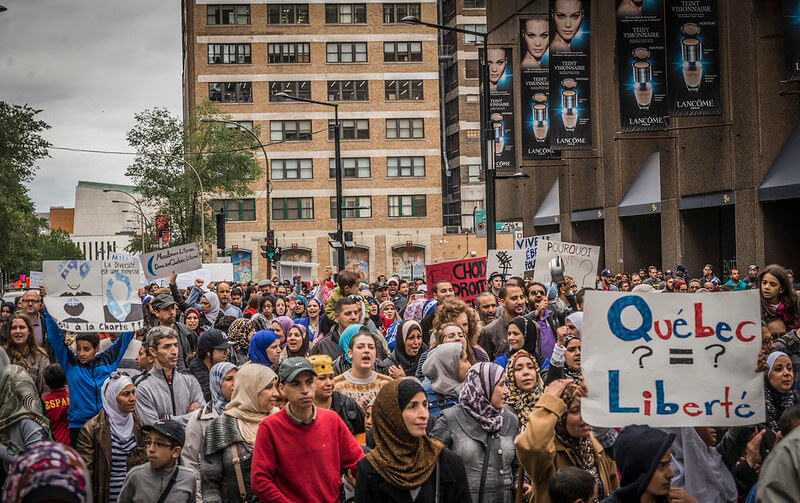Quebec’s Bill 21 is titled An Act Respecting the Laïcité of the State, and does seem controversial from name alone. It was passed by the National Assembly of Quebec on June 16, 2019.
Bill 21 does not directly affect atheists like me. This law should concern us, however, as a matter of human rights. In a free and democratic society like Canada, laws should not take away personal freedoms unless they provide benefits that outweigh the hardship created by the removal of those personal freedoms. At least part of the law fails that benchmark.
The Bill made two notable changes. The first change was that it required having one’s face uncovered in order to give or receive specific public services. The second and more controversial change was that it banned public workers in some positions (including police officer, lawyer, and teacher) from wearing religious symbols during the exercise of their functions.
Assessing the benchmark against the two changes
For the first change, it seems that the benchmark is met. Uncovering one’s face when serving the public or when receiving a service allows others to identify us and to relate to us at a human level. Therefore the benefit is tangible and significant. On the other hand, the number of people affected is very small, and those people are following customs that are marginal even within their own religious group. Therefore the hardship is minimal. The benefits probably outweigh the hardship.
For the second change, however, the hardship clearly outweighs the benefits. Forcing employees to remove religious symbols has no security benefits. The only benefit that one can see is that it gives some members of the public the satisfaction of not having to receive a service from someone whose religion is openly visible. One might have the illusion that this change prevents religious fanatics from joining Quebec’s public service, but that is not the case.
No real benefits but significant hardship
Muslim men, Sikh women, Christians, and most Jews are not required by their religions to display any religious symbols. Therefore, the lack of religious symbols does not guarantee that the person is not a religious fanatic. What the law does is discriminate against sub-groups such as Muslim women and Sikh men without regard to whether they are in fact fanatics or otherwise unable to serve without undue religious bias.
The law ensures that a Muslim woman or a Sikh man who believes that wearing a hijab or a turban is a religious duty can never apply for a wide range of jobs in Quebec unless they remove the religious symbol, which to them is a betrayal of their religion. It forces those individual to choose to either apply for some of those jobs or be true to their personal beliefs. This is a very significant hardship for that segment of the population.
Indulging and reinforcing bigotry
It seems that the only benefit of the draconian restriction on religious symbols is to indulge sentiments of bigotry in people who are uncomfortable seeing Muslim women with hijabs or Sikh men with turbans. By doing so, the law causes harm to the general population and not only to those who wear religious symbols. It robs children and adults of an opportunity to relate to people who look different, and therefore it contributes to social divisions based on race and religion.
False secularism
Atheists have a long history of being discriminated against based on our refusal to abide by the social norms, and therefore we are among the strongest supporters of secularism. Secularism is what Bill 21 claims to reinforce. However, protecting secularism does not mean discriminating against religious people in the public service. It means demanding that they not allow their religious bias to interfere with their work.
If the law was implementing some way of testing job applicants on their ability to do the job without religious bias, it would make sense. It would not be easy to design such a test, however, and it seems that the Quebec government chose the simplistic approach of blindly banning anyone who wears a religious symbol, without regard to the fact that some of those people can do the job without bias while some applicants who do not wear religious symbols cannot do the job without bias.
Opposition is not going away
The Quebec government chose a simplistic and populist approach that does nothing more than appease bigotry while harming Quebec society. Bill 21 opponents staged protests across Quebec on October 6, 2019, four months after passage of the bill.

While the Bill is popular among most Quebecers, opposition to it is not likely to die down anytime soon because the Bill is fundamentally unfair and flies in the face of some basic principles of a free and democratic society.
Fred Maroun is a Canadian of Lebanese origin who lives in the Ottawa area. He has written extensively on the Israeli-Palestinian conflict, including about 200 posts in a Times of Israel blog. Fred Maroun has also written for The Gatestone Institute, The Jerusalem Post, New Canadian Media, and others.






I am English-speaking Canadian living in Montreal. I am an atheist and extremely in favour of secularism and of Bill 21, but it doesn’t go far enough.